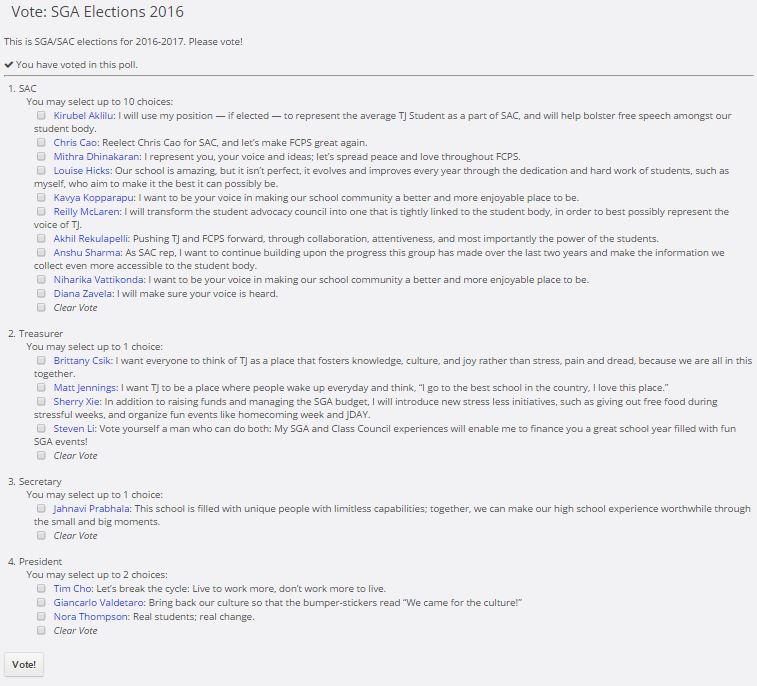Candidates’ Battle for Stress Prevention in SAC/SGA Elections
Photo Courtesy of https://ion.tjhsst.edu/polls/vote/6
Copy of election ballot provided to students for voting procedures, which end on Tuesday, May 3rd.
May 2, 2016
As finals and AP exams begin their annual ‘wreaking’ of stress upon students, candidates for the Student Advisory Council (SAC) and the Student Government Association (SGA) attempted to resolve the issue through promises in their campaigns for this year’s student body election. However, the question of their methods’ effectiveness lingers, as even with similar past protocols, students still pitfalled under the level of curriculum placed upon them.
“I feel like SGA sort of does the same thing every year, and it’s getting too repetitive,” junior and SAC candidate Kirubel Aklilu said. “To make the change happen, I want to actually fight administration on the issues that concern me, including the student advocacy policy. By setting goals that the student government can actually accomplish, I’m going to achieve whatever I set out to do.”
As for the execution of such ventures, many previously elected candidates seek to extend the sense of community between students in all graduating classes, in the hopes that student stress will lessen in the near future.
“One of the biggest issues all grades share is the stress and piling of homework that makes them lose their sleep, but instead of giving support for each other, any time a freshman complains about the workload, upperclassman always dismiss everything they say,” sophomore and SGA Treasurer nominee Sherry Xie said. “[A solution] is the integration of the Big Sibs program (between underclassmen and upperclassmen) into the SGA this year, in hopes that the upperclassmen involved will give advice instead of bashing their younger peers.”
Unfortunately, this great strive for change among students can actually be reduced to a popularity contest, making the issues seem frivolous under the umbrella of loyalty between friends and peers.
“I see the same people getting the same positions in class council year after year just because they have done it before,” Aklilu said. “It’s during freshman year that it’s truly a popularity contest. Following that, it’s more of a scenario where people say they have more experience even though the root cause of the experience was only popularity.”
Luckily for candidates who aren’t blessed by previous student fame, voters may nonetheless grant them a chance if they yield enough leadership merit to truly improve the school.
“The real candidates who deserve to win are those that have genuine interest in helping students,” freshman Mithra Dhinakaran said. “Candidates who have ideas, are vocal, and put the wellbeing of our school and community above anything else should be the leaders for all years to come.”






